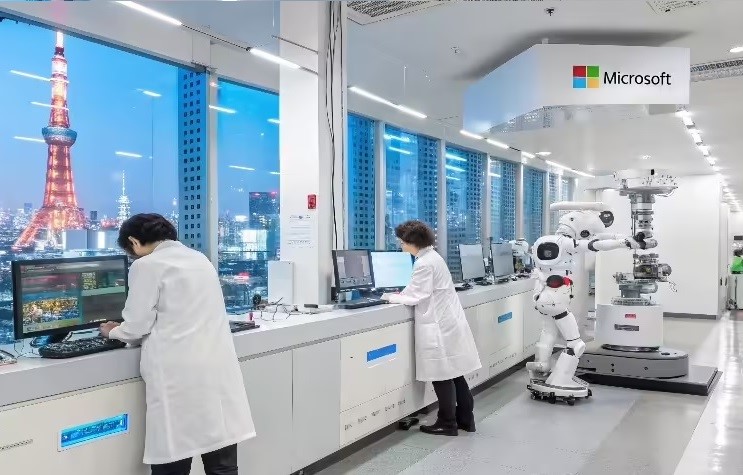Microsoft recently opened its first R&D center in Japan in Tokyo. This move is not only a high recognition of Japan's robotics heritage, but also marks an important step in Microsoft's global strategy. The new institute will focus on cutting-edge applications of Embodied AI across multiple industries, particularly in manufacturing and healthcare. This development is expected to drive technological innovation and have a profound impact on society, including increased productivity and improved health services.
1. Japan's technological superiority and Microsoft's strategic layout
Peter Lee, president of Microsoft Research, noted that Japan has long been a leader in robotics, especially in industrial robots and humanoid robotics. Japan's precision engineering, automation systems, and robotics development capabilities make it an important source of global technological innovation. That's why Microsoft chose to set up a research center in Tokyo, aiming to leverage these unique technological advantages to advance the development of embodied AI.
The establishment of the R&D center not only strengthens Microsoft's global network of technology labs, but also deepens Microsoft's cooperation with Japanese companies. By partnering with leading robotics companies and universities in Japan, Microsoft will be able to make breakthroughs at the intersection of robotics and artificial intelligence. The partnership with Japanese companies will enable Microsoft to integrate local expertise while accelerating technological innovation through global resources.

Pictured: Microsoft opens its first R&D center in Japan
2. The convergence of artificial intelligence and robotics
Microsoft's research direction will focus on embodied artificial intelligence, which is a frontier field for the integration of artificial intelligence and robotics. Embodied AI is not just a simple algorithm development, but combines intelligence with the physical world to give robots the ability to "perceive" and "move". By working closely with Japan in the field of robotics, Microsoft will explore the potential of this technology for real-world applications, especially in the areas of automated manufacturing and smart medical devices.
As the global demand for smart manufacturing and smart health services continues to grow, the results of Microsoft's R&D centers could be game-changing across multiple industries in the coming years. Microsoft's move not only boosts its competitiveness at the forefront of global technology, but also heralds that Japan will play a more important role in the advancement of global robotics and artificial intelligence technology.
3. Support from the Japanese government and market environment
The Japanese government's support for technology companies provides a good environment for international companies such as Microsoft to grow. Japan's Chief Cabinet Secretary Yoshihide Suga said that the government welcomes large overseas IT companies to set up R&D bases and data centers in Japan, and is willing to provide policy support to promote domestic digital investment and AI research and development. The government's positive stance not only provides more investment opportunities for technology companies, but also helps Japan accelerate the pace of its technological innovation.
In addition, Japan's unique industrial structure and technological infrastructure, especially its strong strengths in the robotics industry, make the country a popular destination for global technology companies to invest. Microsoft's opening of its R&D center in Tokyo is not only part of the company's global expansion strategy, but also a further recognition of Japan's leadership in global robotics technology innovation and applications.
4. Strategic significance in the global technology landscape
Microsoft's R&D center will promote global cooperation and development of artificial intelligence and robotics to a greater extent. As the global demand for smart solutions continues to rise, especially in the manufacturing and healthcare sectors, embodied AI will be a key driver of change. These technologies can not only improve industrial production efficiency, reduce costs, but also improve the accuracy and personalization of medical services.
Microsoft's cooperation with Japan further strengthens the ties between the two in the global technology innovation network, and also shows that cross-border cooperation will play a key role in the development of artificial intelligence and robotics. Through this R&D center, Microsoft is able to leverage Japan's technological expertise to drive the adoption and adoption of AI and robotics on a global scale.
5. The market outlook is in line with global competition
Microsoft's move also reflects the current competitive landscape in the global technology industry. As technology companies continue to seek innovative breakthroughs, how to effectively combine artificial intelligence and robotics has become an important trend in global technology development. Microsoft's investment in Japan is not only to seize opportunities in the technology field, but also to accelerate the strategic layout of the global market through innovation cooperation with local Japan.
At present, Japan's technology accumulation in the field of robotics and artificial intelligence, as well as its mature industrial environment, make it occupy an important position in the global scientific and technological competition. By setting up an R&D center, Microsoft is able to combine Japan's technological advantages with its own global resources to promote the commercial application of embodied AI and realize cross-border integration of technologies. This cooperation model may become a model case for more multinational companies to set up R&D centers in Japan in the future.
6. Conclusion
Microsoft's R&D center in Tokyo marks a new chapter in the convergence of robotics and artificial intelligence. The center not only demonstrates Microsoft's recognition of Japan's technological prowess, but also means that cooperation and technological development in the field of embodied AI will bring new opportunities and challenges to the world. As AI and robotics continue to advance, Microsoft's strategic move is expected to drive global technological innovation and bring a smarter future to industries.
Through cooperation with Japanese companies and academic institutions, Microsoft will not only be able to obtain more technological breakthroughs, but also provide more advanced technological solutions to customers around the world. As the global demand for AI and robotics continues to grow, Microsoft's R&D center in Japan could become an important engine for global technological innovation.






